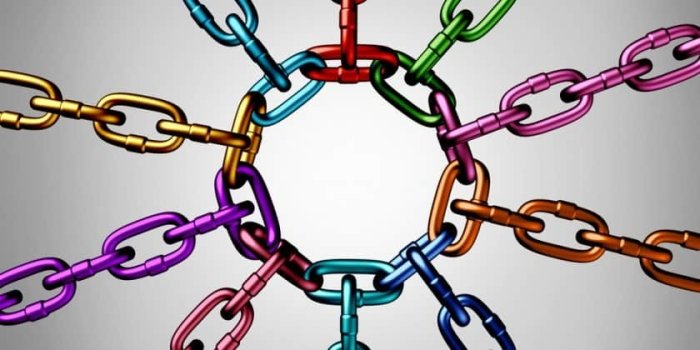K
Kathleen Martin
Guest
Lack of transparency and inadequate tracking system persist in SCM due to inconsistent or lack of quality data to a great extent.
The supply chain has gone intrinsically complex, encompassing multiple players from producers to transporters, from wholesalers to retailers, and from buyers to consumers, unlike the two-man (seller-buyer) simple transaction that existed long ago. In this multifaceted process, the supply chain industry faces a critical challenge in cost, speed and product quality, directly linked to the seamless flow of data or information. Apart from lack of transparency, the hurdles faced in the sector are the complexities in information sharing and delays in data retrieval, which hold back the performance at every stage of the logistics network. Thus, creating pressure on all participants in the value chain to live up to the rising customer expectations, meet profitability targets, and overcome disruptions and delays.
Blockchain technology, which connects silos to a single source of truth through – smart contracts and shared ledgers, can add value to the supply chain by directly addressing these inefficiencies of supply chain management (SCM). Blockchain technology stores and distributes high-quality data, which is immutable, tamper-proof and time stamped. Lack of transparency and inadequate tracking system persist in SCM due to inconsistent or lack of quality data to a great extent, apart from the high amount of paperwork involved, lack of interoperability and limited information on the product lifecycle and transportation history.
Blockchain, which is being increasingly adopted in SCM these days in other parts of the world, rightly addresses some of these core issues, bringing in transparency, trust and traceability, the three inherent virtues of the new technology. By leveraging the decentralized cloud database, stored in non-changeable blocks and shared with all participants, global leaders like Walmart and Carrefour are increasing transparency at every step of the supply chain and adding value to the brand.
This immutable ledger that records every transaction and tracks every asset in the network makes the entire SCM transparent and searchable. The data is shared up to the customer level. In an end-to-end blockchain-enabled supply chain, data is generated and stored from the point of sourcing to the delivery point, while ensuring quality, speed, profitability and transparency. In a classic example of premium dry beef sale, the supplier first uploads data on anti-bacterial fodder and the cow is tagged with an RFID chip, proving its high quality. The producer gets the required info and adds a secured QR code for packed products. The data is shared with the distributor and the product is picked up by the 3PL players who also get the info about storing and transportation. The retailer and the store are enabled with these data. Finally, the customer can scan a QR code via an app and get to know its origin, farm location, ageing, duration, packaging and ingredients. Walmart has implemented blockchain application that enables it to track such products from sourcing a product in China to selling it in the US.
Continue reading: https://www.dqindia.com/quality-data-in-blockchain-to-change-the-way-supply-chains-work/
The supply chain has gone intrinsically complex, encompassing multiple players from producers to transporters, from wholesalers to retailers, and from buyers to consumers, unlike the two-man (seller-buyer) simple transaction that existed long ago. In this multifaceted process, the supply chain industry faces a critical challenge in cost, speed and product quality, directly linked to the seamless flow of data or information. Apart from lack of transparency, the hurdles faced in the sector are the complexities in information sharing and delays in data retrieval, which hold back the performance at every stage of the logistics network. Thus, creating pressure on all participants in the value chain to live up to the rising customer expectations, meet profitability targets, and overcome disruptions and delays.
Blockchain technology, which connects silos to a single source of truth through – smart contracts and shared ledgers, can add value to the supply chain by directly addressing these inefficiencies of supply chain management (SCM). Blockchain technology stores and distributes high-quality data, which is immutable, tamper-proof and time stamped. Lack of transparency and inadequate tracking system persist in SCM due to inconsistent or lack of quality data to a great extent, apart from the high amount of paperwork involved, lack of interoperability and limited information on the product lifecycle and transportation history.
Blockchain, which is being increasingly adopted in SCM these days in other parts of the world, rightly addresses some of these core issues, bringing in transparency, trust and traceability, the three inherent virtues of the new technology. By leveraging the decentralized cloud database, stored in non-changeable blocks and shared with all participants, global leaders like Walmart and Carrefour are increasing transparency at every step of the supply chain and adding value to the brand.
This immutable ledger that records every transaction and tracks every asset in the network makes the entire SCM transparent and searchable. The data is shared up to the customer level. In an end-to-end blockchain-enabled supply chain, data is generated and stored from the point of sourcing to the delivery point, while ensuring quality, speed, profitability and transparency. In a classic example of premium dry beef sale, the supplier first uploads data on anti-bacterial fodder and the cow is tagged with an RFID chip, proving its high quality. The producer gets the required info and adds a secured QR code for packed products. The data is shared with the distributor and the product is picked up by the 3PL players who also get the info about storing and transportation. The retailer and the store are enabled with these data. Finally, the customer can scan a QR code via an app and get to know its origin, farm location, ageing, duration, packaging and ingredients. Walmart has implemented blockchain application that enables it to track such products from sourcing a product in China to selling it in the US.
Continue reading: https://www.dqindia.com/quality-data-in-blockchain-to-change-the-way-supply-chains-work/

